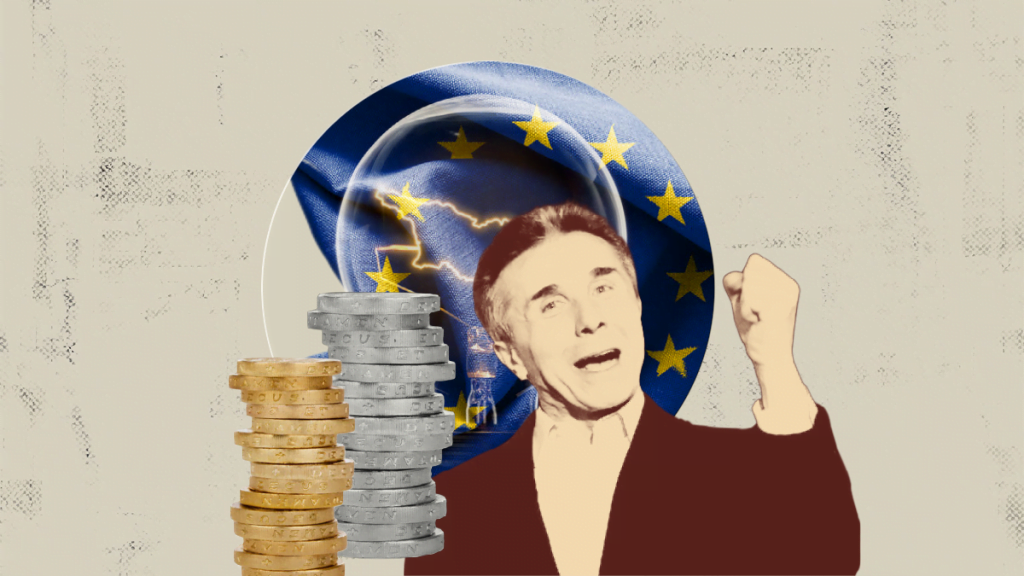The rapidity and zeal with which the Georgian Dream leaders and pundits rushed to the defense of their patron, Bidzina Ivanishvili’s private assets and riches, show that Georgia is not that much Ivanishvili’s political project, but his collateral in the international game – both an insurance and a trade-in chip for protecting his property. Touch my assets, and I will shift Georgia into the opposite camp on a whim, Ivanishvili signals. In this sense, it is true to a degree that “he is not involved in politics” as his minions boast: he has no interest in managing Georgia, he is owning it and pawning it. Georgia’s friends must take note.
Of course, there are trappings of more traditional state capture: enslaved courts and muzzled media, eviscerated political process, fixed procurement deals. These benefit Ivanishvili’s lieutenants – it is easier to pay them off from the state coffers than his private pockets.
In this sense, Georgia-turned-into-an-asset has no sovereign foreign policy, only the private, opportunistic one that maximizes its owner’s profit while minimizing his losses. Hence the ability and, indeed, the readiness of the Georgian Dream to claim something and its exact opposite, often in the same breath. Consider the European Union: while shifting the blame to the victims of pogroms against LGBT people and media, while encouraging, or at least not moving to deter, those radicals who tore down the European flag in front of the parliament, the GD politicians confidently claim their determination to join the European Union. They even blame others for preventing them from doing so, claiming that pointing out the government’s failures is damaging, and unpatriotic.
This has been particularly evident in the past weeks, as Ukraine’s heroic resistance to Russia’s invasion has created a political window of opportunity for Georgia to become an EU membership candidate. Many Georgian civil society activists have been faced with a strange (and false) dilemma. With key democracy indicators sliding, and the government’s commitment to the core principles of human rights and the rule of law questionable at best, shall they continue to speak up and risk the European Commission turning Georgia’s EU application down, or should they stay silent? Georgian Dream politicians have been bullying them to exercise self-censorship, saying that activists (and opposition) are damaging the country’s future and represent “the party of war”.
But such rhetoric is simply tactical. What it conceals, is how politics have been emptied of their meaning, just like the official job titles of the GD ministers and politicians conceal their real standing, determined by their loyalty to the boss, their commitment to the constituency of one. Of course, Georgia’s failings are no secret to the EU – indeed the EU Parliament service has published quite a damning report. The EC will take its decision on merits, but GD is already preparing the ground for shifting the blame: to the enemies, foreign and domestic.
If it weren’t so, how could one possibly explain the broadside attack at the West, and the United States, portrayed by the government as Georgia’s strategic partners? And over what?! Millions of private dollars in a Swiss bank, a couple of artworks and a helicopter that THE boss has trouble moving across the borders. This is absurd, but the absurdity does not make it less real, because the incentives driving such outbursts are tangible and quantifiable – in millions, billions of dollars of Ivanishvili’s assets, which are at stake.
For weeks, if not months, Civil.ge team finds it harder and harder to bring you the news, because news have been emptied of their meaning. Instead of facts, there are assumptions and insinuations. Instead of statements, series of dog-whistles that make little sense without going into interpretation – thus opening oneself up to accusations of partiality and bias. We know many of our colleagues in journalism are facing the same problem. Georgians are consuming a fibreless news diet, spiced up by often empty, personalized polarization.
These are troubled times, and many of Georgia’s partners may be inclined to cherry-pick the facts that fit the image of Georgia moving towards European objectives. But the reality bites, and what is happening in Ukraine puts the crucial importance of facts into sharp contrast. This is not the time to avert the eyes, shrug and hope things will settle down later, on their own. Georgia’s body politic is being eroded, perhaps beyond repair, by the chokehold of oligarchic money.
Elsewhere, in the past, the path to EU candidacy has been a moment to extract crucial concessions from reticent governments: in the Balkans, the arrests of key war criminals, and the dissociation of the ruling parties from the legacy of wars preceded candidacy in both Croatia and Serbia, even though this was not a formal condition. Georgia is facing a different challenge, which requires a different response. But it calls for a clear message from the country’s international partners – We see what you are doing!
European future is a choice, the choice that the Georgian people is sticking to the tune of 75%, and the government needs to talk the talk, as well as walk the walk.

